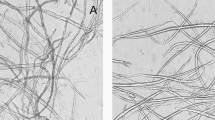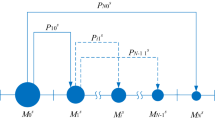Abstract
DURING recent years a good deal of attention has been given to the investigation of the molecular weight of native cellulose, but the results are highly discordant, the values most frequently quoted being those of Mark1 (about 30,000, on the basis of micell length by X-ray analysis and other data), Stamm2 (40,000, by sedimentation equilibrium in the ultra-centrifuge) and Staudinger3 (about 120,000 by extrapolation of viscosity vs. molecular weight data). The sedimentation equilibrium method is the soundest theoretically, and we have recently demonstrated experimentally4 that it gives correct molecular weight values for long-chain molecules which, like cellulose, give highly viscous solutions.
This is a preview of subscription content, access via your institution
Access options
Subscribe to this journal
Receive 51 print issues and online access
$199.00 per year
only $3.90 per issue
Buy this article
- Purchase on Springer Link
- Instant access to full article PDF
Prices may be subject to local taxes which are calculated during checkout
Similar content being viewed by others
References
H. Mark, Trans. Faraday Soc., 29, 41; 1933.
A. J. Stamm, J. Amer. Chem. Soc., 52, 3047; 1930.
H. Staudinger, Trans. Faraday Soc., 29, 18; 1933.
J. Amer. Chem. Soc., 55, 4319; 1933.
Author information
Authors and Affiliations
Rights and permissions
About this article
Cite this article
KRAEMER, E., LANSING, W. Molecular Weights of Celluloses. Nature 133, 870–871 (1934). https://doi.org/10.1038/133870c0
Issue Date:
DOI: https://doi.org/10.1038/133870c0
This article is cited by
-
Über die Alterung der Alkalicellulose
Monatshefte für Chemie (1936)
Comments
By submitting a comment you agree to abide by our Terms and Community Guidelines. If you find something abusive or that does not comply with our terms or guidelines please flag it as inappropriate.



